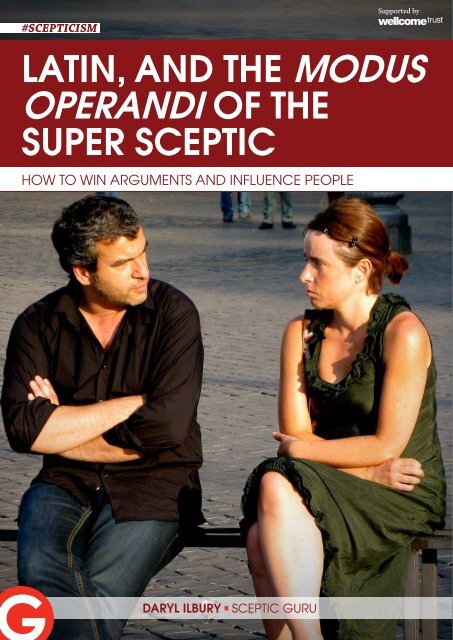Guru10-spreads
Guru10-spreads
Guru10-spreads
- No tags were found...
Create successful ePaper yourself
Turn your PDF publications into a flip-book with our unique Google optimized e-Paper software.
#SCEPTICISM<br />
LATIN, AND THE MODUS<br />
OPERANDI OF THE<br />
SUPER SCEPTIC<br />
HOW TO WIN ARGUMENTS AND INFLUENCE PEOPLE<br />
DARYL ILBURY • SCEPTIC GURU<br />
RIGHT:<br />
A tablet with<br />
a 5th century<br />
Latin inscription<br />
located in the<br />
Colosseum in<br />
Rome.<br />
LATIN, AND THE MODUS OPERANDI OF THE SUPER SCEPTIC<br />
English is rapidly becoming the lingua<br />
franca of scientific communication,<br />
allowing scientists the world over to<br />
share their ideas and discoveries. But<br />
English is not the only language to<br />
empower scientists, and give voice<br />
to scientific reason. It’s ironic that<br />
one of the most powerful tools for<br />
debunking both pseudoscience and<br />
those superstitions rooted in archaic<br />
thinking is itself thousands of years<br />
old. So what is this language? Our<br />
Sceptic Guru, Daryl Ilbury, has the<br />
answer: it’s Latin.<br />
Don’t laugh and roll your eyes. It’s easy to<br />
dismiss Latin as a ‘dead’ language, particularly<br />
given that it’s no longer the official language<br />
of any country. However, not only is it still<br />
used, but it also remains the bedrock of several<br />
cornerstones of modern civilisation – most<br />
notably law and medicine. And for this reason<br />
it evokes strength and authority.<br />
It’s also impressive. Whip out the odd Latin<br />
phrase in polite discourse, especially with a<br />
dash of restrained ceremony, and it has the<br />
same impact as George Clooney announcing<br />
at a ladies’ book club that he also has a PhD<br />
in astrophysics: discussion suddenly stops and<br />
everyone pauses to ponder what’s just been<br />
said, invariably with at least an eyebrow cocked.<br />
So here are some handy Latin phrases to<br />
keep tucked into your sceptic tool belt, and<br />
explanations of how to use them in situations<br />
drenched in superstition and pseudoscience:<br />
The dinner party scenario: ‘How I<br />
got pregnant…’<br />
You’re at a dinner party and a woman claims<br />
that she is finally pregnant after months of<br />
trying, and it’s all because – on the advice of<br />
an aunt – she and her husband made love<br />
with a potato under the bed. After everyone<br />
has smiled and nodded, you lean forward and<br />
say wistfully: “Aaah – the classic post hoc ergo<br />
propter hoc fallacy”. When everyone looks at you<br />
with raised eyebrows you explain – with mild<br />
surprise that they obviously didn’t get it – it<br />
means ‘after this therefore because of this’.<br />
This is a commonly-used line of reasoning<br />
employed by peddlers of pseudoscience and<br />
superstitions, which basically goes like this: if<br />
B follows A then A must have caused B. This<br />
is ridiculous because it assumes coincidence<br />
is causation. Example: after successive games<br />
without scoring, a footballer dons a new pair of<br />
underpants when getting into his kit, and later<br />
scores a goal. Ergo, the new pair of underpants<br />
must have been responsible.<br />
PAGE 19 • FEBRUARY/MARCH 2013 • ISSUE 10 • GURU<br />
Previous Page: (People) Flickr • Ed Yourdon, (Tablet) Wikimedia • Wknight94, (Pregnant Woman) Flickr • mahalie


